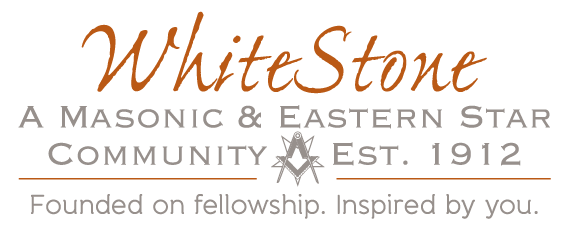Seniors these days are living longer than ever – and staying more active than ever. This is especially true with the Baby Boomer generation as they reach their retirement years. This generation isn’t content to sit back and let the world pass them by. Instead, they’re taking steps to make their seniorhood the best stage of life yet. They’re fiercely independent and want everything the world has to offer – so for some, the thought of moving into senior living may seem counterintuitive to that goal.
“Independent living actually can transform a senior’s life and make them even more independent than ever before,” says Marie Dunn, Director of Sales and Marketing at WhiteStone, a Masonic and Eastern Star retirement community in Greensboro, NC. “We’ve had many of our residents say I wish I’d moved here sooner! There are so many benefits to living in an independent living community like WhiteStone. We like to say that ‘you’re not giving up your independence; you’re enhancing it.’”
We’ve put together some of the most frequently asked questions about independent living so that you or your senior loved one can determine if independent living is a good option … and when it should be considered.
What is independent living?
Independent living is a type of senior living that is characterized by, well, independence! These types of communities offer private living situations for senior individuals, usually age 62 and older. Depending on the community, seniors can live in apartments, cottages or even homes. Unlike living on your own, however, life is maintenance- and care-free. Residents at independent living communities pay one monthly fee to gain access to all the amenities on site, including dining, fitness and wellness opportunities. It’s a perfect solution for active, independent seniors who want to say goodbye to chores and tasks and instead spend their time doing the things they dream about.
Why is independent living a good option?
Independent living is a good option because it removes a lot of the stress and worry that comes with living on your own. For starters, as previously mentioned, it’s maintenance-free. No longer do you have to deal with winter weather, trimming trees, maintaining a yard or dealing with home repairs. You don’t have to clean or even cook if you don’t want to. Independent living is also a good option because it allows seniors to “age in place.” Communities and living spaces are designed with the needs of aging adults in mind. There are emergency call systems and helpful things like grab bars installed throughout the area. Walkways are wide, and there aren’t any stairs to climb. In other words, it’s set up for you as you get older – but allows you to live the active and exciting life you want now.
What are signs I might be ready for independent living?
If you answer “yes” to more than one of these questions, you may be ready for independent living:
- Are you finding it harder to take care of your current home – or do you just not want to deal with home maintenance anymore?
- Are you feeling lonely or socially isolated, and you’d like to live somewhere you can make and nurture meaningful relationships?
- Do you worry about your safety living on your own? Would you like to be somewhere that help is available at a moment’s notice, if needed?
- Although you’re healthy and active now, are you concerned about your living situation and whether or not your current house can handle the needs of an aging adult?
- Do you simply want to have more opportunities to live an engaged, fulfilled and exciting life and enjoy everything your retirement has to offer?
What is the best age to move into independent living?
Here’s the good news: it’s never too soon to move into independent living. Some individuals move as soon as they meet the age eligibility requirement. If you really want to take advantage of everything an independent living community has to offer, it’s generally considered best to move sooner rather than later. When you move at a “younger” age – say, in your 60s – the maintenance-free lifestyle allows you to stay active and put your dream retirement goals into place. You’re also able to make the community your “home” so that as you do get older, you feel comfortable and secure. Really, the best age to move into independent living is whenever you’re ready.
What happens if my health needs change?
Independent living is perfect for seniors who need little to no help living independently. However, there may come a time when you or a loved one require additional assistance. At WhiteStone, we offer a comprehensive range of health services for our residents. For seniors who need help with the tasks of daily life or things like medication management, we offer in-home care provided by friendly, caring, trustworthy caregivers. We also have short- and long-term skilled nursing, rehabilitation and memory care all available on campus. When you choose WhiteStone, you always have a home – for life.
What should I look for in an independent living community?
Choosing an independent living community is a lot like buying a home. First, you’ll want to write down your needs – the things that you absolutely must have in order to live there. Next, you’ll want to create a list of wants – the amenities, services and features that would be nice to have, but not necessarily a deal breaker if the community doesn’t have it. Then, with your list in hand, it’s time to research different communities.
Besides your personal preferences, there are certain things you should look for in an independent living community. For starters, you want a community that has a wide variety of wellness activities that take a whole-person approach. Wellness opportunities ensure that residents have the ability to maintain their health and fitness and age as well and as healthily as possible.
Next, you’ll want to research the dining options available on campus. How many dining venues are there? Is there a chef on staff? What sort of food is offered, and how often does the menu change? How are dietary and taste preferences accommodated?
You’ll also want to make sure that the living spaces are what you’d like and what will work for your lifestyle. At WhiteStone, we offer three different types of living options: apartments, cottages and free-standing single homes. Finding the right floor plan for your retirement years is very important towards your health and comfort.
One of the biggest draws to independent living is the peace of mind it provides with the ability to age in place. So, you’ll want to make sure that your independent living community offers services and care for whatever you might need. Some communities offer every level of care, like WhiteStone does. Others may only offer one or more lifestyle options.
Independent living is an excellent choice for today’s active, healthy and independent seniors who want to live a retirement lifestyle that’s carefree and worry-free. If you or someone you love is considering independent living, we would love to talk to you about the exceptional senior living experience WhiteStone provides. Contact us today!
Founded on Fellowship. Inspired by You.
WhiteStone is the first and oldest Life Plan Community in North Carolina. Founded in 1912 as the first Masonic Fraternal Home in the U.S. created solely to care for the elderly, WhiteStone is open to everyone looking for a secure retirement in a comfortable, welcoming setting.
WhiteStone offers residents a host of amenities and services designed to make life easier, healthier and happier. In addition to independent living, WhiteStone offers a full range of senior health services, if and when the need arises, including memory care, in-home care, short- and long-term skilled nursing and rehabilitation. Assisted living services are coming soon to the community.
Since WhiteStone is a Life Plan Community, residents will never need to move in order to get the health care they need. At WhiteStone, we provide expert personalized care on campus in our top-rated Care and Wellness Center.
For more information about our community, please contact Marie Dunn at 336-459-0904.

